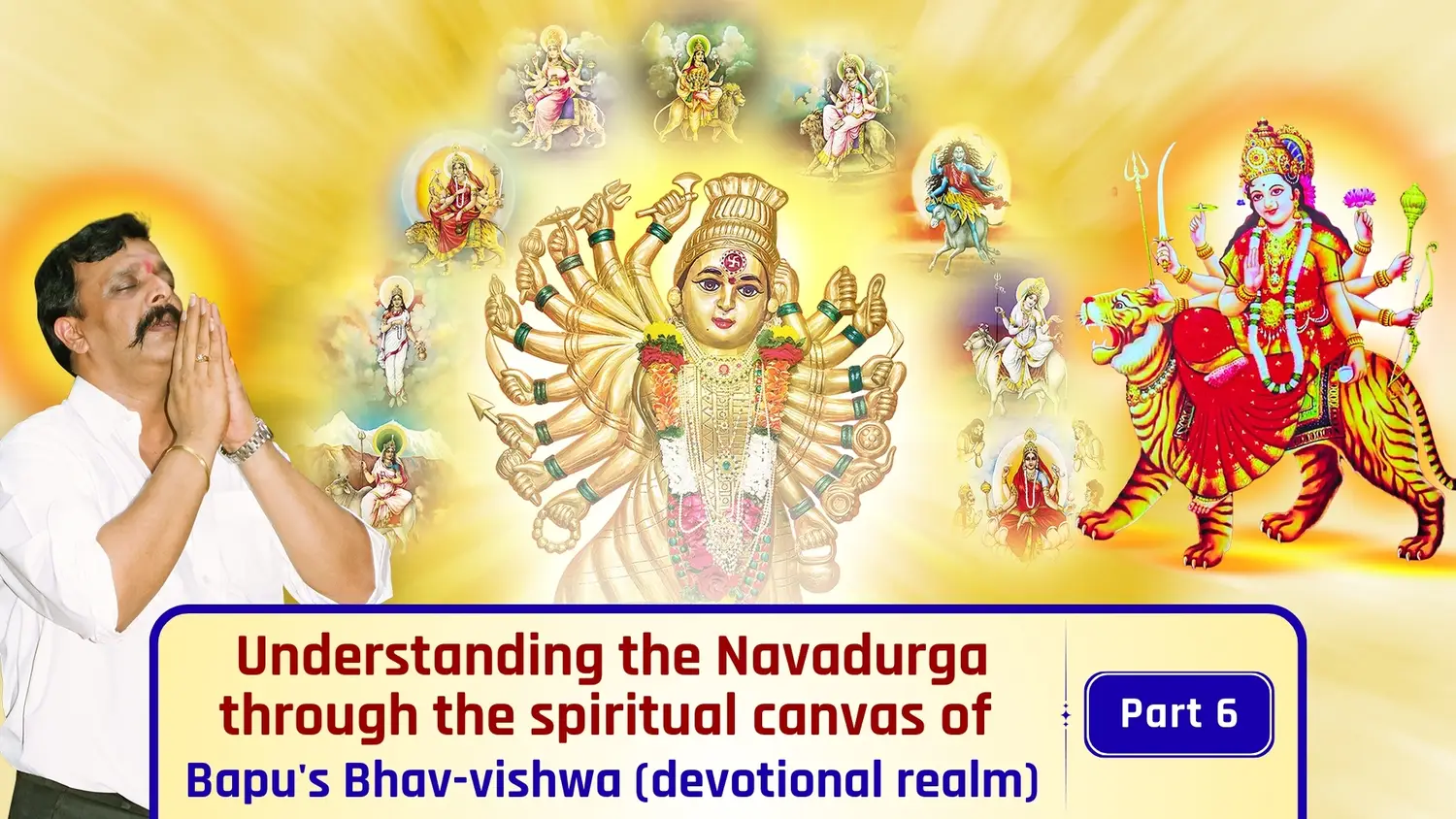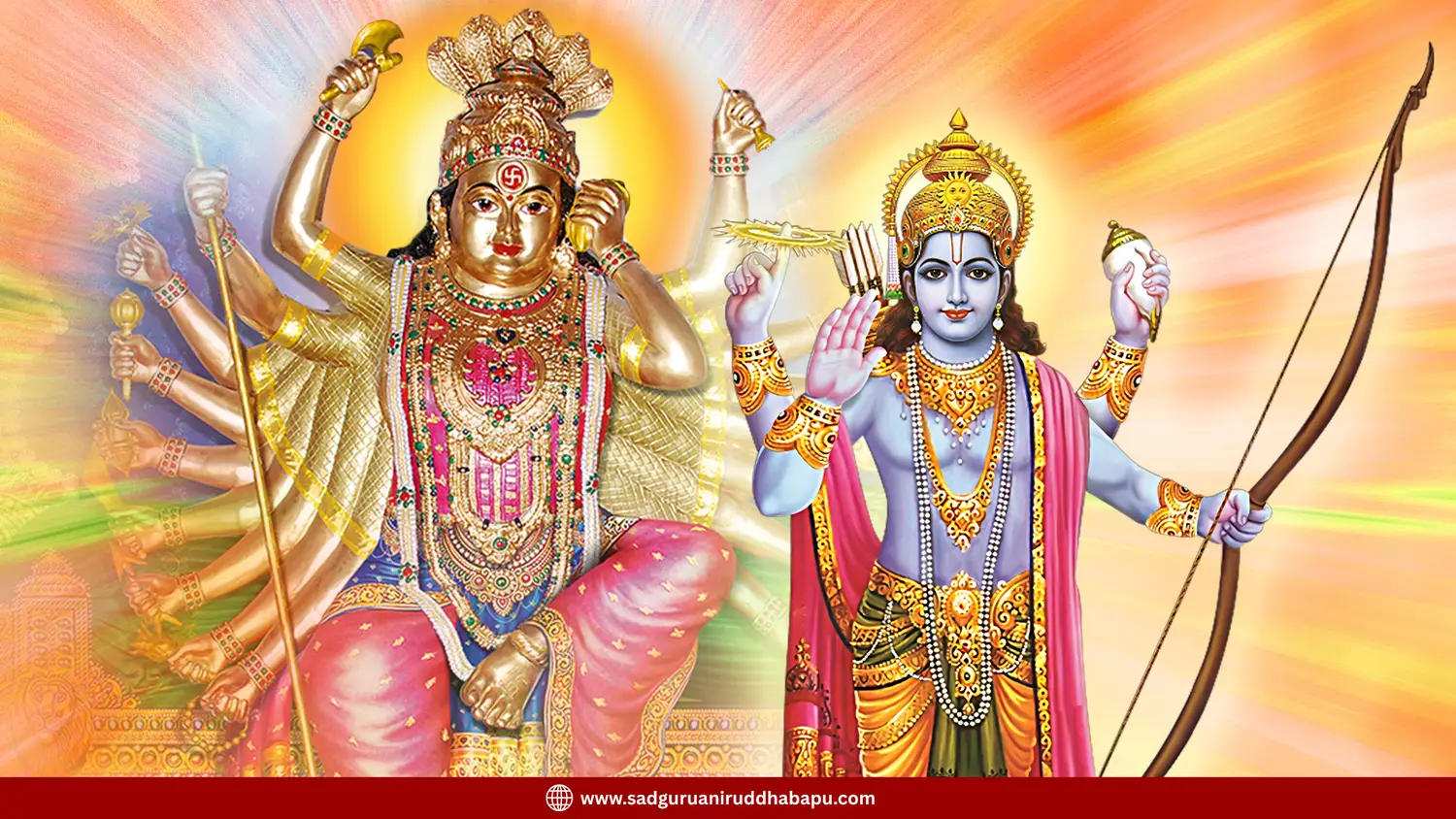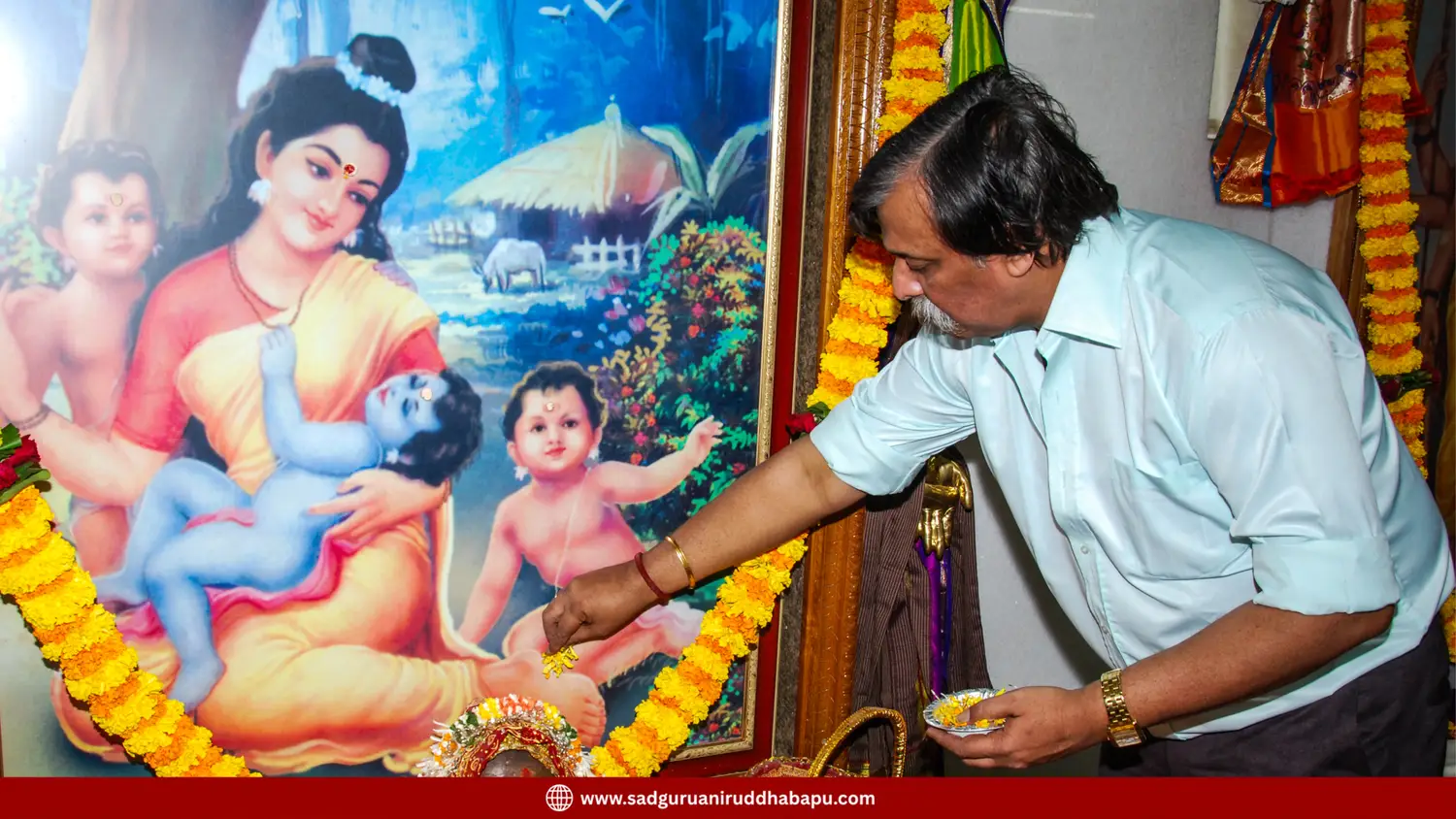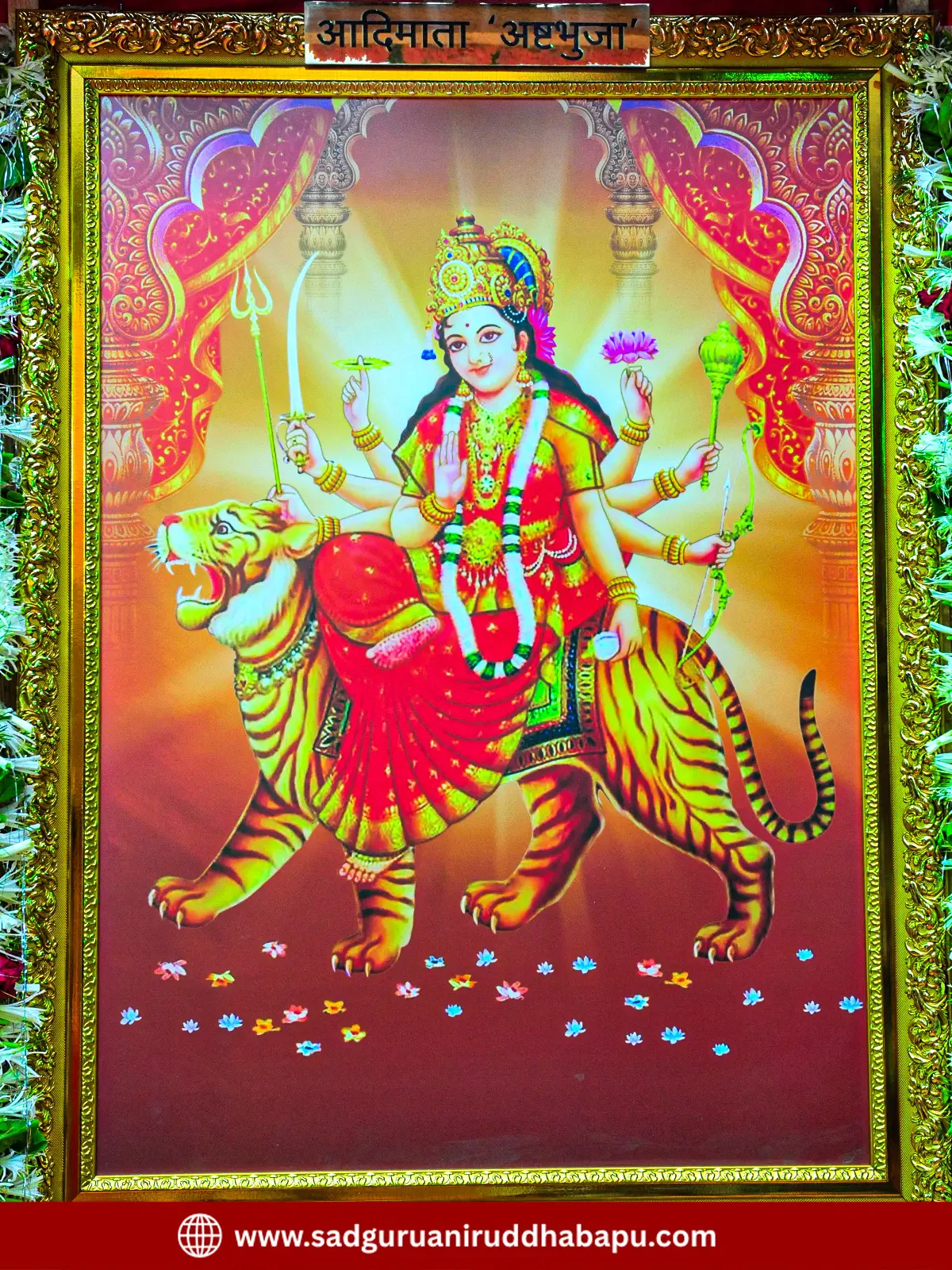Understanding the Navadurga through the spiritual canvas of Bapu's Bhav-vishwa (devotional realm) - Part 6

Reference: From the editorials numbered 1390 and 1391 in the Tulsipatra series of the daily ‘Pratyaksha’ by Sadguru Shree Aniruddha Bapu.
Sadguru Shree Aniruddha Bapu writes in the Tulsipatra editorial no. 1390:
While Brahmavadini Lopamudra was still speaking, Brahmarshi Katyayana’s wife, Mahamati Kriti (just as a female equivalent of Rajarshi is Rajayogini, the female equivalent of Maharshi is Mahamati), came running there. She had come there from her penance.
She only wished to see her beloved daughter because she could not see her every day as she was not a Brahmavadini.
Seeing her eagerness, Brahmavadini Lopamudra smiled and said, “Look! So much has happened here on Kailash. The five forms of Navadurga have already manifested. Yet, even with all this, Mahamati Kriti’s penance was never disturbed.
But now, the fact that her one and only beloved daughter, Navadurga Katyayani, has come here — this alone broke Mahamati Kriti’s penance.
O Maharshis, I ask you a question — this Mahamati Kriti, who has broken her penance for her family’s sake and come here, can she now become a Brahmavadini?
Because only through this penance could she have become a Brahmavadini, and this indeed was the very plan of the Adimata and Bhagwan Trivikram Himself.”

Everyone present was completely puzzled by this question. No one could find a clear answer.
Seeing this, Brahmavadini Lopamudra said, “O dear ones, we shall soon get the answer to this. Let us wait for a while.”
But Mahamati Kriti had not even heard Lopamudra’s question. Kriti was only looking at Goddess Katyayani with unblinking eyes.
Kriti had not folded her hands.
Kriti was not even stepping forward to embrace her daughter.
Kriti was not speaking a word to her daughter.
Yet on Kriti’s face shone immense satisfaction.
At that very moment, Goddess Katyayani assumed the child form, leapt down from the lion, and ran straight into the arms of her human mother Kriti.
Now Kriti tightly embraced the child Katyayani, repeatedly kissed her daughter’s cheeks, and gently stroked her hair.
The child Katyayani too, repeatedly saying “Amba! Amba!” (My mother! My mother!), rested in her mother’s arms with great contentment.
Then, in a single moment, only two tears fell from the eyes of Mahamati Kriti, and the child Katyayani immediately took them upon her own head.
In the very next moment, almost the same thing happened as had happened a little while earlier in the life of Rajarshi Shashibhooshan, when he had become a Brahmarshi.
All the assembled Brahmarshis and Brahmavadinis began to clap in jubilance, showering flowers upon this unparalleled mother-daughter pair.
Bhagwan Trivikrama then declared, “O Kriti! The penance you were performing pales in comparison with this present act of yours.
Therefore, by your own right and through the grace of the Adimata, you have become a Brahmavadini.”
At that very moment, the newly initiated Brahmavadini Kriti was kissed on the forehead by her daughter Katyayani.
At that very moment, the child form of Katyayani i.e., the young Katyayani herself, now appeared in her divine form of the Goddess, mounted on the lion.
And the newly initiated Brahmavadini Kriti, coming back to her senses, folded both her hands and began to sing the stotra of the sixth Navadurga Katyayani.
Bringing everyone present back to their senses after witnessing this supremely beautiful scene, Brahmavadini Lopamudra began to speak:
“On the eleventh and twelfth steps (levels) of the Shambhavi Vidya, after freeing one’s mind from the demons on the ninth and tenth steps, one must now nurture and cultivate the qualities of affection, love, compassion, sympathy, kindness, compassion, and selfless service to others. One must practice penance so that these qualities become a natural part of one’s life.
Hurting another’s mind without cause, lacking sympathy for others, failing to act with kindness and compassion even when one has the power to do so, these tendencies must be given up forever.
The power of the Adimata that brings about all this is the sixth Navadurga, Katyayani.
Therefore, she took birth in the womb of a pure yet ordinary woman whose very name was Kriti (to act).
This sixth Navadurga Katyayani is the daughter of Brahmavadini Kriti.
Yes, even at the time of Katyayani’s birth, Kriti was indeed a Brahmavadini.
But to support the penance of Brahmarshi Katyayana — that is, to bring the Goddess herself as a daughter into her own womb, she renounced her ‘Brahmavadini’ status temporarily.
O all assembled, know that ‘sacred, noble, and righteous motherhood is the greatest penance of all.”

Bapu further writes in the Tulsi Patra editorial no. 1391:
While Brahmavadini Lopamudra was still singing the praises of motherly love, Agastya’s son, Brahmarshi Kat, came near his daughter-in-law Kriti, and from the other side, Kat’s wife, Brahmavadini Kanti, also arrived.
Both Brahmarshi Kat and Brahmavadini Kanti lovingly embraced their daughter-in-law, who was still in a deeply emotional state. Brahmavadini Kanti was the daughter of Brahmarshi Kashyapa.
Kanti, holding Kriti’s hand in hers, said, “My daughter, I had eight sons but not a single daughter. Therefore, the longing for a daughter always remained alive in my heart, and because of this desire, I could never progress to become a ‘Brahmavadini’ from ‘Mahamati’. My father Kashyapa and my husband Agastya both told me this many times, yet my mind was never ready to give up the yearning for a daughter.
But the moment you married my eldest son Katyayana and came to live in our ashram, you gave me, through your love, the deep joy of having a daughter. Being fulfilled by this joy of daughterly love, I finally became a Brahmavadini.”
Now Brahmarshi Kat began to speak:
“O daughter-in-law Kriti! You are truly blessed, and you have blessed our entire lineage.
O son Katyayana! The tender affectionate bhakti (Vatsalyabhakti) of both you and your wife is unparalleled; in fact, it is absolutely unique. The very deity whom you worshipped, you both accepted Her as your daughter, and while raising Her like your own child, you both continued to worship Her with the same devotion, and you still do so.
O fathers Agastya and Kashyapa! You are the greatest and the eldest. You both very well know that the devotion filled with parental love (Vatsalyabhakti) is the truest form of Madhurabhakti (the sweetest devotion). And the spreading of this truest Madhurabhakti everywhere becomes an essential need of the Dvapara Yuga and the Kali Yuga.
For this reason, my wife and I wish to contribute in some way. Please give us your guidance and command.”
Then Brahmarshi Agastya and Brahmarshi Kashyapa, along with their wives, came near their children, and the four of them together asked the same question to the Adimata Shreevidya and to Bhagwan Trivikrama.
Now Bhagwan Trivikrama, assuming his single-faced form, spoke very gently and lovingly to the four of them:
“Your knowledge is vast, and so is your devotion. Why are you asking me this question?”
All four of them answered in one voice, “Because you alone are the supreme Matrubhakta (devoted to Mother).”
Bhagwan Trivikrama said, “Yes, perhaps! But this means only one thing — from where and why did this devotion to the Mother arise in me?
It is because the genuine and unconditional love she has for me is the same she has for every true Shraddhavan and thus, it is my Adimata Chandika herself is the original and one and only source of devotion filled with parental love (Vatsalyabhakti), i.e., the truest Madhurabhakti.
And when Shiva’s wife Parvati completely absorbed this source in the form of Skandamata, then and only then did the sixth Navadurga, Katyayani, manifest from Skandamata.”
“O Adimata! O Mahishasuramardini! O Mahadurga! O Shreevidya! O Anasuya! It is my humble prayer at your lotus feet — please answer the question of these four.”
At Bhagwan Trivikrama’s words, the forms of the Adimata as ‘Anasuya’ and ‘Shreevidya’ united, and first the eighteen-armed Mahishasuramardini, adorned with all weapons, stood there radiating brilliance.
But the moment Bhagwan Trivikrama, in the innocence of a child, ran to her and held the edge of her apparel, she was immediately seen as the eighteen-armed Chandika, seated upon the throne of Manidweep, smiling serenely with motherly love flowing from her eyes.

Now, as soon as she touched the head of the single-faced Bhagwan Trivikrama with her hand, he appeared as an eight-year-old child, ran, and sat upon her lap.
As she fondly caressed him, this Adimata, born from the sacred fire of consciousness, began to speak:
“Yes, my beloved sons and daughters! In the Treta Yuga, very soon, Parashurama and Shrirama will be born, and the worship of both of them in their child forms, that is, the truest Madhurabhakti will deeply attract all devotees.
On the birthdays of Parashurama and Shrirama, offering them parental love, that is, naming ceremonies, cradling them, singing lullabies by both men and women, and worshipping their child forms with bathing rituals and other sacred acts — all this will free devotees from many sins.
And when wicked-minded people gradually attempt to diminish the childlike devotion towards Parashurama, then in the Dvapara Yuga, Shrikrishna will be born. In his child form, he will perform countless divine leelas, pastimes, and sweet acts and will himself become the Premras i.e., the very essence of love.
On the birthday of this king of sweetness, this Gokul-dwelling child Krishna, I myself, as his sister and as ‘Vindhyavasini,’ will increase the glory of this day.
In the Kaliyuga, the birthday celebrations of Shrirama will help devotees strengthen their devotion. And every devotee will celebrate Shrikrishna’s birthday with immense love and enthusiasm by celebrating Shrikrishna’s Raasleela on his birthday, devotees will receive the truest Madhurabhakti directly from me, which teaches ‘Purity is the only norm.’
O Agastya and Kashyapa! Brahmarshi Katyayana and Brahmavadini Kriti will themselves be born as Dasharatha and Kausalya, the parents of Shrirama. These same two will also be born as Vasudeva and Devaki, the parents of Shrikrishna. And Brahmarshi Kat and Brahmavadini Kanti will be born as Nanda and Yashoda, giving birth to me myself and joyfully experiencing the childlike leelas of Shrikrishna.”
